Across the country, parking lots — once bustling with shoppers, workers, and cars inexplicably parked at a diagonal — have become ghost towns.
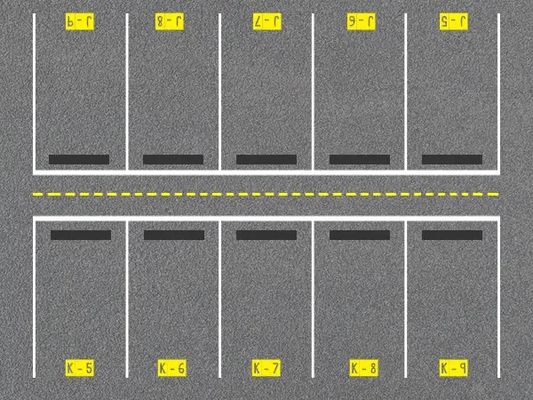
With businesses shuttered and many people working from home, demand for parking is down 90% since mid-March, according to data from the startup SpotHero. This decline has hit every sector of the industry, from airport lots to privately-owned residential spaces.
Parking shapes both the landscape and the economics of our cities: It influences how we commute, how much public green space we have, and even how much we pay in rent.
But even in good times, it’s also an industry riddled with inefficiencies. Vacant and underutilized parking spaces have long predated COVID-19.
With lots across America feeling especially barren, some entrepreneurs are seizing on this moment to reconfigure the market — and, in some instances, create entirely new use cases for giant grids of pavement.
The parking economy
The secret weapon of parking is that no one really thinks about it.
You don’t comparison-shop for parking spaces. You generally don’t seek out the lot with the best amenities. You don’t need things to look polished or up to date. A parking space is a parking space.
But beneath that exterior blandness is a $10.6B industry.
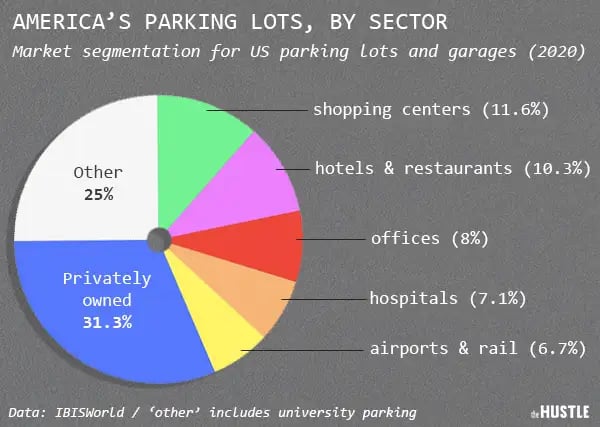
Graphic: The Hustle / Data: IBISWorld
There are at least 3 non-residential parking spots for every car in America. Some estimates place that figure at more like 8 to 1. Supply far outstrips demand. But because of decades of policy (which we’ll touch on a bit later), owning a parking lot is a sure bet anyway.
For investors, the biggest selling point is how easy it is to maintain a parking space.
Real estate developers love to buy parking lots because there’s no demolition required, no building conditions, no risk of surprises, and minimal maintenance overhead. One developer noted that there isn’t a chance they’ll find, say, asbestos halfway through the project.
This is why, on the private side, the biggest players are massive real estate and transportation businesses:
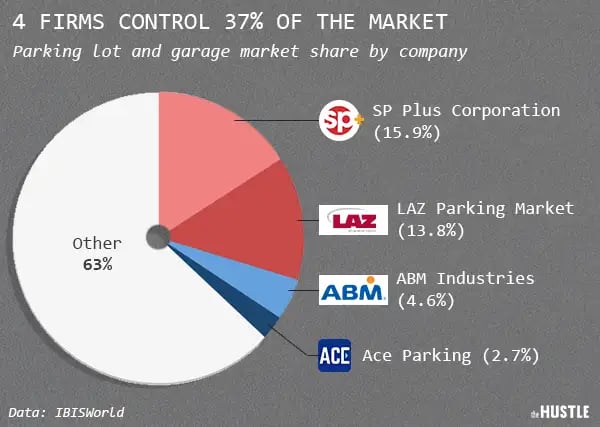
Graphic: The Hustle / Data: IBISWorld
Garages or car condos will also sometimes sell parking spots to individuals for a consistent income.
The New York Times reported on a couple in Park Slope, Brooklyn who, in 2005, purchased an extra parking space in a local garage for $45k. They decided to rent it out for $600 a month.
After taxes and a fee they paid to the garage, they pocketed $310 a month. At that rate, they would have made back their full investment in rent alone after a little over 12 years. But, in 2016, they decided to put their space on the market. The final selling price? $285k — over 6 times what they originally paid for it.
But what makes the right parking investment so profitable in normal times? The answer has a lot to do with regulation. Most municipalities have what are called mandatory parking minimums — regulations that require businesses and residences to keep a certain number of parking spaces according to their size.
Dodger Stadium, for instance, has about 16,000 parking spaces — and when there isn’t a game happening, those spaces sit empty, closed off to the public.
In certain cities, these minimum regulations have resulted in rather eye-popping parking-spot-to-population ratios.
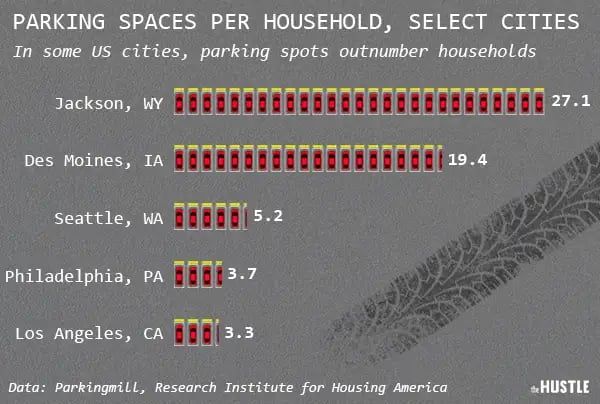
Graphic: The Hustle / Data: Parkingmill, Research Institute for Housing America
As much as one-third of some cities’ land area is devoted to parking. Depending on how you spin it, those vast empty lots are either a natural outgrowth of the uncertain cycles of commuting or a symbol of wastefulness for a country that still struggles to find room for new parks or public housing.
All of the empty parking spaces we’re seeing in the age of COVID-19 might seem like an ominous sign of the times — but the reality is, most are sitting empty day in and day out, whether or not a pandemic is ongoing.
The entrepreneurs trying to shake up parking
Even before COVID-19 hit, a growing movement had been trying to fix this problem.
Some neighborhoods in Los Angeles have been trying to remove mandatory parking minimum laws, and cities like San Francisco have tossed them out entirely.
But the push extends beyond policymakers. Over the last few years, a set of startups — among them Parking Spotter, Spacer, and SpotHero — have cropped up to solve what some see as inefficiencies in the DNA of the parking world.
These companies function like Airbnb for parking: Whether you’re a business or individual whose parking spaces are sitting empty, you can earn a little bit of extra cash (and, presumably, save a whole lot of stress) by putting it on the market.
A similar model is Curbstand, a startup that partners with restaurants, hotels, airports, and residential buildings to provide valet service to customers. Co-founder Arya Alexander leases 10k spaces across the city for about $50 to $100 per space per month, which he has set aside to park customer cars.
When you consider that two-hour parking in Los Angeles costs $9.56 on average, you see the profit potential. Even if only one customer per day uses each parking space, he’ll still earn back 2x to 5x what he owes in rent. Alexander tells us that, after all other fees are factored in, Curbstand typically operates at a 20% profit margin.
“Some restaurants will pay $10k a month for us to be there,” he said. “Other restaurants pay us an hourly rate.”
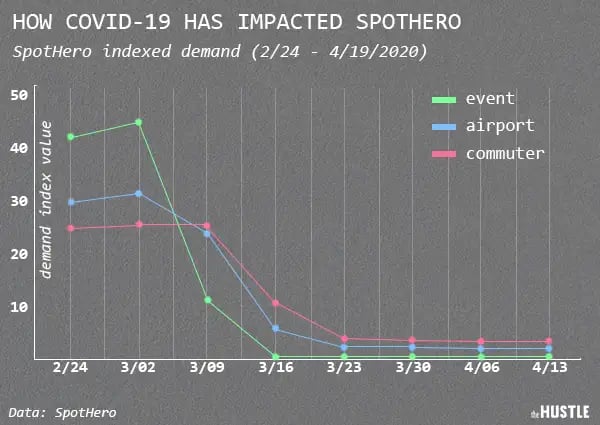
Graphic: The Hustle / Data: SpotHero
But for many of these companies, the mission isn’t just about helping people park; it’s also about changing how we approach private parking lots on the whole.
“What we’re working toward is really changing people’s mindsets around parking lots,” said Jonathan Barkl, who launched AirGarage in 2016.
Barkl’s company, AirGarage, partners with local institutions that own their parking lots but that don’t usually max out their capacity — say, a church. It rents those excess spaces, at 25 to 50 cents below the average market rate, to other drivers.
AirGarage takes a cut, the church makes 70% of the money, and the customer gets a cheaper-than-usual place to stick their car while they race to the dentist’s office.
According to Barkl, there are so many better uses for our miles and miles of parking spaces: Empty parking lots could host public gatherings, community events, and new businesses.
“If we can change our mindset around parking lots being locked away for private use, we can open up new spaces that can be used in various ways beyond just parking,” he said.
So when COVID-19 hit and parking ground to a halt, Barkl seized the opportunity.
Enter, the parking pivots
Like so many others in the industry, Barkl saw his customer base evaporate sometime around mid-March.
“The revenue basically dried up,” he said. But after the initial panic, he thought, “This is a perfect opportunity for us to actually take a deep breath and run those experiments that we’re excited about.” He decided to put to the test his vision of a repurposed parking industry.
So he called up the churches, hotels, and other businesses that AirGarage had partnered with, and he asked them to convert their lots for events.
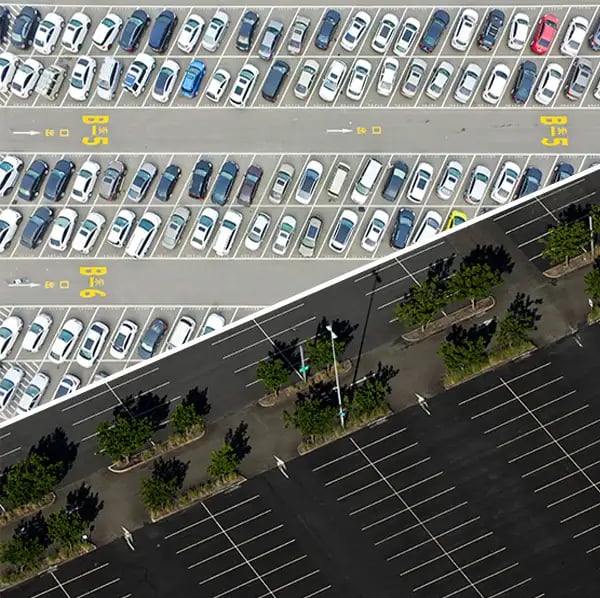
Lots that once bustled with life now sit empty — but some entrepreneurs are trying to change that (photos: Cameron Spencer, Visual China Group, via Getty Images)
On short notice, AirGarage convinced a hotel in Berkeley to host a drive-in movie theater in its parking lot. The first of several screenings featured Pixar’s “Onward” and went for $25 per car. All 20 available spaces sold out.
Next AirGarage tried its hand at a pop-up grocery store in another Berkeley parking lot — Barkl’s team worked with wholesalers, set up an order form, and handed off groceries to approaching cars.
Another startup, Boxcar, saw its revenues fall to zero — literally, $0 — in the middle of March. Boxcar built out a business that lets work commuters reserve parking spaces near train stations and other big transport hubs. On days when they don’t want to drive, Boxcar offers shuttles, mainly in the New York City area.
So Boxcar liquidated the money they’d allocated for marketing and advertising — about $20k — and they put it toward a last-ditch pivot: Turning those unused parking lots and commuter buses into a grocery delivery service.
Demand soared. Last week, revenue hit $8k — the biggest week in the company’s history.
“In the last two weeks we’ve built a business that’s twice as large and significantly more profitable than our parking business, which we built over the last three years,” said Joe Colangelo, Boxcar’s CEO.
Across the industry, others have had similar ideas about repurposing lots.
A San Antonio funeral home is hosting drive-in, live-stream funerals. Doctors are using their parking lots to treat patients with non-emergency problems. Lawyers are notarizing wills between metered spaces. Some restaurants have set up tables in their empty lots for people waiting on pickup.
Will COVID-19 inspire us to repurpose all of those excess parking spaces, even after the pandemic subsides? Maybe not. The most likely innovation to come out of this moment is fully contactless payment, according to SpotHero founder Mark Lawrence, who is trying to implement contactless models across the industry.
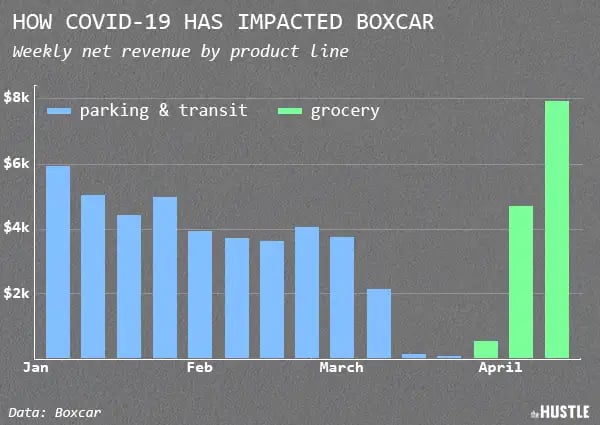
Graphic: The Hustle / Data: Boxcar
But even before the pandemic struck, we were hurtling toward an America defined by parking lot ghost towns.
Seattle has started giving out transit passes rather than requiring on-site parking at each residential building. Car cities like Los Angeles are pouring billions into public transit, all while Dallas is turning excess parking lots into parks.
Even more consequential is ridesharing. “Rideshare has affected airport parking, hotel parking and restaurant parking,” said Lawrence. “The effects are already there.”
One 2019 study suggested that ride-sharing might drive down demand for parking, concluding that 26.4% of riders “would have driven and needed a parking space if the ride-hailing services did not exist.”
That doesn’t mean parking is going to disappear. But if 1) municipalities continue to unravel their parking minimum laws, 2) public transit investments increase over climate and other concerns, and 3) ridesharing stays on pace to grow, we are going to have to contend with all of our excess parking.
What we do with those parking spaces remains to be seen. Build parks? More housing? Host community events? Movie screenings? A new class of entrepreneurs is poised to come up with answers.
But it seems likely COVID-19 isn’t just showing us a strange and temporary dip in demand. It’s giving us a taste of the future.

